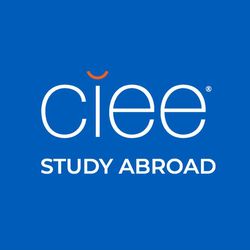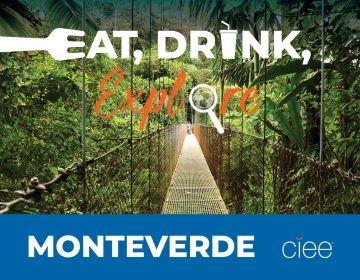CIEE Launches First-Ever Carbon-Neutral Study Abroad Program
Students concerned about the impact of study abroad on their carbon footprint can breathe a big sigh of carbon dioxide. CIEE’s new Global Institute in Monteverde plans to become carbon neutral in the next year and ensure that each of its study abroad programs offsets students’ carbon footprint through reforestation, sustainable farming, and conservation projects.
The new Global Institute site is located in Costa Rica, on 155 acres surrounded by forested mountains covered with a thick, dense cloud forest. Coffee and tropical fruit trees, organic produce gardens, and a robust livestock farm will enable the site to produce 50% of all food consumed by staff, students, and faculty. All food waste will then go through a biodigester and become biogas for cooking fuel.
According to site director, Karen Masters, Ph.D., “The new facility has the technology to measure and monitor our carbon emissions and because we know how quickly our trees turn greenhouse gasses into biomass, we’ll be able to offset our emissions related to electricity vehicles, livestock, and food consumption.”
The campus was owned by the University of Georgia for the past 18 years and used for ecotourism, research, and study abroad programs in business, humanities and ecology. CIEE purchased the site in April and is currently upgrading technology and laboratory equipment to enhance fundamental science courses in STEM and Society and Sustainability and the Environment programs. (The Tropical Ecology and Conservation program will continue to run at the Monteverde Biological Station.)
“The beauty of taking STEM courses here is that students can apply what they discover in a petri dish to their surroundings. Studying how plants take photons from sunlight, use them to turn carbon dioxide into carbohydrates, and form new leaves is happening right before their eyes,” said Masters.
In addition to a new wet lab and ungraded equipment, the site will use a flipped classroom design to facilitate hands-on learning and group discussion.
Fall ’19 will be the first to host students at the new site, which can accommodate more than 100 participants at a time. CIEE programs will run throughout the year and include six-week block programing, plus January and summer sessions. The site will also host high school study abroad programs on sustainability and conservation, and Faculty-Led and Custom programs.
Masters sees the new site becoming a regional hub for sustainability practices and hopes to collaborate with surrounding communities – from the cloud forest to the coast – on sustainability initiatives including habitat restoration, carbon neutrality, and waste management. In turn, the region will be doing its part to help the entire country of Costa Rica achieve its goal to become the first carbon neutral nation in the world by its 200th birthday in 2021.
Related Posts
EAT, DRINK, EXPLORE: MONTEVERDE
BEST FOOD TO EAT IN MONTEVERDE There is absolutely no way to avoid eating casado in Costa Rica. This traditional comida tipica (typical dish) is on every restaurant and home... keep reading
BLOCK to BLOCK: Monteverde to the Yucatán
It takes just one day to get from the lush premontane landscape of Monteverde to the balmy Yucatán Peninsula. But you’ll need a full block – at least – to... keep reading
Manuel Antonio - Monteverde Study Tour
FALL '19 BLOCK I - MANUEL ANTONIO Manuel Antonio is located on the Pacific coast of Costa Rica, near Quepos, in Puntarenas province. It is a tourist area full of... keep reading










